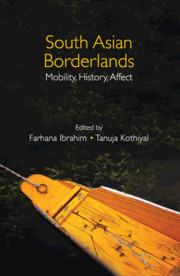Book contents
- Frontmatter
- Contents
- List of Figures and Tables
- Acknowledgements
- Introduction
- 1 Paradise at the Frontier: Kashmir as a Political Terrain and Literary Landscape in the Mughal Empire
- 2 Borders in the Age of Empire and Nation-States: The Honeycomb of Borderlands: Kumaun, Western Tibet and Far Western Nepal
- 3 Borders, Difference, Recognition: On the Cause(s) of Gorkhaland
- 4 Embattled Frontiers and Emerging Spaces: Transformation of the Tawang Border
- 5 Relative Intimacies: Belonging and Difference in Transnational Families across the Bengal Borderland
- 6 Reading Parijat in Nepal: The Poetics of Radical Feminism Negotiating Self and Nation
- 7 Commodity Journeys and Market Circuits: Making Borders ‘Natural’ in Colonial Western Himalayas
- 8 Frontiers, State and Banditry in the Thar Desert in the Nineteenth Century
- 9 Bureaucracy and Border Control: Ethnographic Perspectives on Crime, Police Reform and ‘National Security’ in Kutch, 1948–52
- 10 Frontier as Resource: Law, Crime and Sovereignty on the Margins of Empire
- About the Contributors
- Index
6 - Reading Parijat in Nepal: The Poetics of Radical Feminism Negotiating Self and Nation
Published online by Cambridge University Press: 17 September 2021
- Frontmatter
- Contents
- List of Figures and Tables
- Acknowledgements
- Introduction
- 1 Paradise at the Frontier: Kashmir as a Political Terrain and Literary Landscape in the Mughal Empire
- 2 Borders in the Age of Empire and Nation-States: The Honeycomb of Borderlands: Kumaun, Western Tibet and Far Western Nepal
- 3 Borders, Difference, Recognition: On the Cause(s) of Gorkhaland
- 4 Embattled Frontiers and Emerging Spaces: Transformation of the Tawang Border
- 5 Relative Intimacies: Belonging and Difference in Transnational Families across the Bengal Borderland
- 6 Reading Parijat in Nepal: The Poetics of Radical Feminism Negotiating Self and Nation
- 7 Commodity Journeys and Market Circuits: Making Borders ‘Natural’ in Colonial Western Himalayas
- 8 Frontiers, State and Banditry in the Thar Desert in the Nineteenth Century
- 9 Bureaucracy and Border Control: Ethnographic Perspectives on Crime, Police Reform and ‘National Security’ in Kutch, 1948–52
- 10 Frontier as Resource: Law, Crime and Sovereignty on the Margins of Empire
- About the Contributors
- Index
Summary
Following a wave of political and social movements centring around identity politics which David Gellner (2007) called ‘ethnogenesis’, Nepal continues its search for cultural and social identities as a post-conflict nation-state. Its search for identity draws from the constitution promulgated in 2015 which formally closed the chapter of its decade-long Maoist insurgency and set the country on the path towards reconciliation among various cultural and ideological communities. This constitution states prominently its resolve to build an egalitarian society recognising the ‘multi-ethnic, multi-lingual, multi-religious, multi-cultural and diverse regional characteristics’ (Government of Nepal 2015). Further, it should not be forgotten that Kathmandu-driven constitutional discourses on diversity took a whole new dimension when challenged by people who live on the borders and whose loyalty to national sovereignty were questioned every so often. That this constitution was promulgated as a show of solidarity among previously warring political constituencies within Nepal, countering a strong message sent by the state of India to concede to the demands of the border population or the Madheshis, signals that identity politics is multidimensional in Nepal as elsewhere. Nepal’s rejection of what it considered ‘imperialist interference’ irked the Indian state to such an extent that immediately after the promulgation of the constitution, it imposed a six-month long blockade on its border with Nepal which had been left historically open for non-commercial flow of people and goods, causing an acute shortage of fuel and essential supplies thus bringing everyday life in Kathmandu to a halt.
Border politics played a central role in setting the direction for Nepal's earlier constitutions in addition to the one that frames contemporary Nepali nationalism. The 1992 constitution, promulgated after ousting the Hindu king's one-party Panchayat regime, came to fruition following a border blockade that lasted for 13 months. The constitution before this, promulgated in 1951, also was made possible by a dramatic border crossing by King Tribhuvan Shah into India, thus stripping cultural legitimacy off the rule of the Rana family, known as the ‘lesser kings’ among Nepali people but deriving their deliberative power from the British. It is reasonable to suggest that the politics of border and border crossing have politically and symbolically steered how the Nepal–India relationship evolved in the past half a century.
- Type
- Chapter
- Information
- South Asian BorderlandsMobility, History, Affect, pp. 146 - 171Publisher: Cambridge University PressPrint publication year: 2021
- 1
- Cited by

